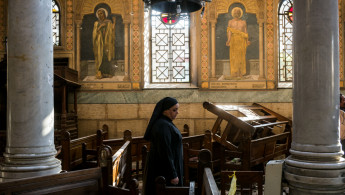For Egyptians, there's not much to celebrate this Christmas
Egyptian Copts are still try trying to come to terms with the religious bigotry behind the suicide bombing in a Cairo church that killed 27 people during Sunday mass.
"Coptic Christians are deeply troubled this festive season. Our emotions are a mixture of grief and fear," US-based Coptic activist Jolia Milad told The New Arab.
"This act of terrorism has not been the only incident against the Christian community in the run up to Christmas."
 |
Coptic Christians are deeply troubled this festive season. Our emotions are a mixture of grief and fear |  |
Milad said that the suicide attack was a direct result of the ongoing conflicts in Syria and Iraq and the spread of IS and its extreme interpretation of Islam.
Making up about 10 percent of Egypt's population of 90 million, the Coptic Orthodox are the Middle East's largest Christian minority community.
Egypt's Coptic Orthodox Church celebrates Christmas on 7 January. Before the fast, faithful observe a vegan fast of 40 days, refraining from eating meat, poultry or dairy.
Egypt's Copts have also been the target of deadly violence after the 2011 uprising that toppled president Hosni Mubarak and the 2013 ouster of his elected Islamist successor after just one year of rule.
Islamists have accused the Christian community of supporting the 2013 military coup led by army general turned President Abdel Fattah al-Sisi.
 |
Making up about 10% of Egypt's population of 90 million, the Coptic Orthodox are the Middle East's largest Christian minority community |  |
Mina Kozman, a chemist from Cairo, said that this Christmas he would visit family and break his fast with a large meal of roast lamb. However, he added that the recent events will be in the back of his mind.
"I am troubled by what's happened, but I saw a lot during the 2011 revolution so I am not scared. I do though feel worried for loved ones who are too weak to defend themselves," the 27-year-old said.
"Our community has been used by the government and in turn been punished by extremist groups. Persecution is a reality we face in daily life… all we can do is hope it doesn't become worse."
 |
Our community has been used by the government and in turn been punished by extremist groups. Persecution is a reality we face in daily life… all we can do is hope it doesn't become worse |  |
He added that in these difficult times he and many other Egyptians have turned to dark humour to alleviate their worries.
Around one million Copts have emigrated mainly to North America and Australia since the 1950s.
Bishoy is one of the many young people who want to find a better life for themselves abroad.
"I've had enough of it here. I can't find a proper job or even a girlfriend here. This Christmas things will be even worse than were a year ago for the fifth year in a row," Bishoy, who asked not to be fully identified, said.
"I want to go live with my uncle in Australia and start a new life away from this oppressive government and anti-Christian society," he added.


